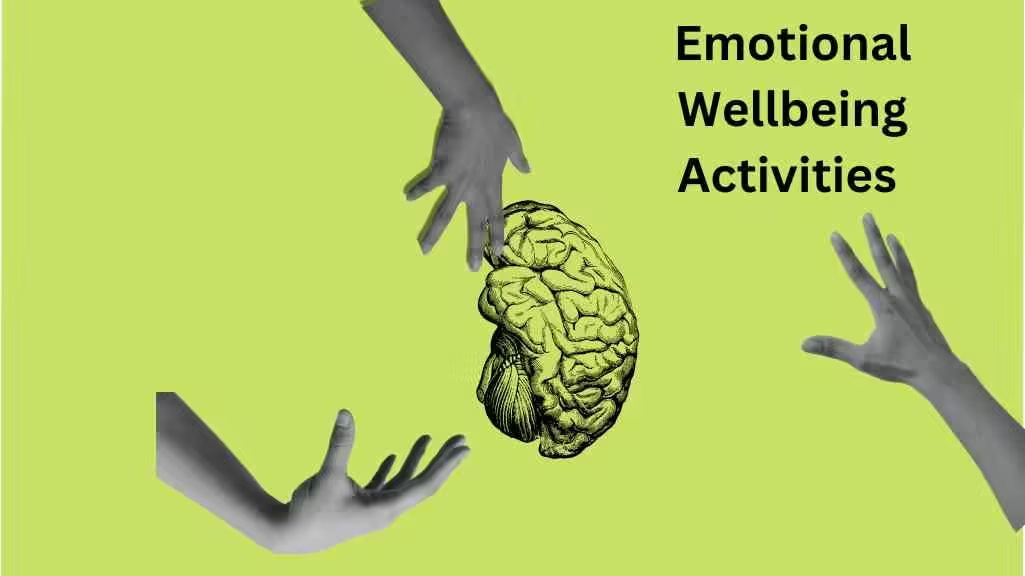Introduction: Emotional Wellbeing
In today’s world which is characterized by speed, emotional health has never been so important. Emotional wellbeing means managing and expressing emotions adequately, developing resilience in life’s circumstances and maintaining a positive outlook on life. It is an important aspect of mind health that affects how we think, feel and act. When one gives priority to things that matter most such as emotional wellbeing activities, they lead a more balanced and fulfilling lifestyle with more healthy personal ties.
Table of Contents
Key Issues or Aspects
Emotional wellbeing has a number of key issues which affect mental health differently including:
1. Stress Management
Stress is a common part of modern day living and its impact on emotional wellness cannot be over emphasized. Anxiety, depression amongst other related mental problems can result from continuous stress. The ability to manage stress effectively helps in maintaining emotional stability.
2. Emotional Regulation
Emotional regulation is necessary for mental health; Emotional dysregulation can lead to mood swings, irritability and impulsivity thereby affecting personal relationships and overall life satisfaction.
3. Social Connections
For the sake of emotional wellbeing strong social connections must be forged between individuals; or else feelings of anxiety & depression would be experienced due to isolation & loneliness hence the significance of maintaining good relationships.
4. Self-Awareness
Self-awareness entails recognizing our emotions, strengths plus weaknesses among many others. It is an essential component of EQ which greatly influences personal as well as professional accomplishments.

Impact or Importance
The importance of emotional wellbeing goes beyond several spheres:
1. Personal Health
Good emotional health corresponds with better physical health since people with higher levels of positive emotion are less likely to get sick than their unhappy peers whose bodies are full of inflammation causing cytokines. They have lower levels of these, better immune systems function and chronic diseases risks decreased.
2. Professional Success
Job performance depends on an individual’ s level of emotional wellness while at work; Good emotional well-being leads to more productive employees who are deeply involved in their jobs and can manage job related stress hence aiding in career advancement and c job satisfaction.
3. Social Harmony
At a societal level, emotional wellbeing contributes to social harmony; When someone is emotionally healthy it enables them build and maintain good relationships that support a positive community setting.
4. Mental Resilience
Emotional wellness strengthens mental resilience enabling individuals to navigate through life’s tough moments. Resilient people are able to bounce back from adversity and keep a positive attitude even in the midst of challenges.

Strategies or Solutions
To improve one’s emotional health there are several activities and strategies one can undertake; here are some tips for improving emotional health:
1. Mindfulness and Meditation
Practicing mindfulness techniques especially meditation helps people stay present and reduce stress. Regular meditation improves emotional regulation, enhances self-awareness too.
2. Physical Activity
Physical activity has been shown as an effective means of enhancing emotional wellbeing. Exercise releases endorphins which uplift mood while also reducing stress levels. Yoga, jogging or dancing greatly enhance your emotional health.
3. Journaling
Writing about emotions and experiences may bring about clarity on certain issues; journaling helps people to understand their feelings on different situations by identifying patterns leading towards better emotion management strategies.
4. Social Engagement
The need for maintaining strong social connections cannot be overemphasized; being active socially through joining clubs or participating in community events fosters a sense of belonging and support.
5. Professional Help
Seeking professional assistance, such as therapy or counseling, might be advantageous. Mental health professionals can provide guidance, support, and effective strategies for managing emotions
6. Hobbies and Interests
Engaging in hobbies and interests that bring joy can improve one’s emotional wellbeing. Creative pursuits like painting, music, gardening can be used as an avenue for self-expression and relaxation.
7. Healthy Lifestyle Choices
Emotional health can be positively influenced by making or opting for healthy lifestyle choices such as balanced diet, adequate sleep and reducing alcohol intake. All choices improve physical health thereby promoting emotional wellbeing.
Case Studies or Real-life Examples
Case Study 1: Mindfulness in the Workplace
A flagship technology company introduced a mindfulness program to its workforce due to the high levels of stress among the employees. The program included daily meditation sessions and workshops on emotional regulation. Within six months, workers reported their stress levels reduced by 30%, increased focus on targets and better job satisfaction.
Case Study 2: Community Gardening Project
The idea of starting a gardening project came up among members residing in one urban locality with the aim of combating social isolation within the community. Neighbors worked together to plant and maintain a garden plot that was accessible to all members of the association. In addition to improving aesthetics in the area, this initiative also promoted social connections among people residing within that region hence more connectedness was felt by participants; they also experienced greater improvement in their emotional wellbeing.
Case Study 3: Journaling for Emotional Regulation
Journaling was introduced as an intervention to promote emotional regulation in adolescent learners during a study conducted at a high school level involving high school students. Students were asked to reflect upon their experiences during each day through writing prompts designed specifically for this purpose After three months, participants improved on emotion regulation, anxiety went down while academic performance got better.
Conclusion
Emotional wellbeing is an integral part of mental health that affects every aspect of life. Emotional well-being could be enhanced if individuals understand key issues related to their emotional health and adopt practical strategies towards addressing them like activities such as mindfulness, physical exercises and journaling among others. Emotional balance can be maintained through activities such as social engagement, mind fullness and exercise. Demonstrations from the real life or case studies show how these things are altered by individuals and communities for better results. This culminates to a healthier, more resilient and fulfilling life that has emotional wellbeing as its priority.
Frequently Asked Questions (FAQs) about Emotional Well-being Activities for Mental Health
1. What are some productive activities that can be used to enhance emotional well-being?
Answer: Mindfulness and meditation practices, regular physical exercise, journaling, maintaining social connections, hobbies and professional help are effective activities to improve emotional well-being. These activities assist in stress management, improving emotional regulation as well as fostering connection and meaning.
2. How is emotional well-being influenced by physical activity?
Answer: Physical activity helps improve emotional well-being through the release of endorphins which are natural mood enhancers. Moreover, exercise decreases levels of body stress hormones like adrenaline and cortisol. Consistent physical exercises can minimize depression symptoms and anxiety, improve sleep patterns and enhance general moods plus energy levels.
3. Can mindfulness and meditation really make one emotionally regulated?
Answer: Definitely! The effectiveness of mindfulness and meditation on one’s emotions is worth noting. By focusing on the present moment, these two practices enable people to stay calm even amidst challenging situations besides reducing stress since they increase self-awareness in an individual’s life. Consequently, this enables them better manage their emotions when facing stressful events.
4. How important is it for emotional health to have social connections?
Answer: Social connections play a vital role in preserving mental health. This helps with belongingness as individuals will feel more included; it creates a sense of support during tough times thereby lowering loneliness hence making positive interactions improve your mood because that contribute happiness leads to community perfectionism as well.
5. What is the importance of journaling to emotional health?
Answer: Journaling is very important in maintaining emotional health due to self-expression and reflection space it avails. Writing about a person’s mental state helps a great deal in controlling emotions, highlighting various issues as well as providing ways of dealing with them. Enhancing self-awareness, reducing anxiety and raising the level of concentration are some results that can be achieved through regular writing.

